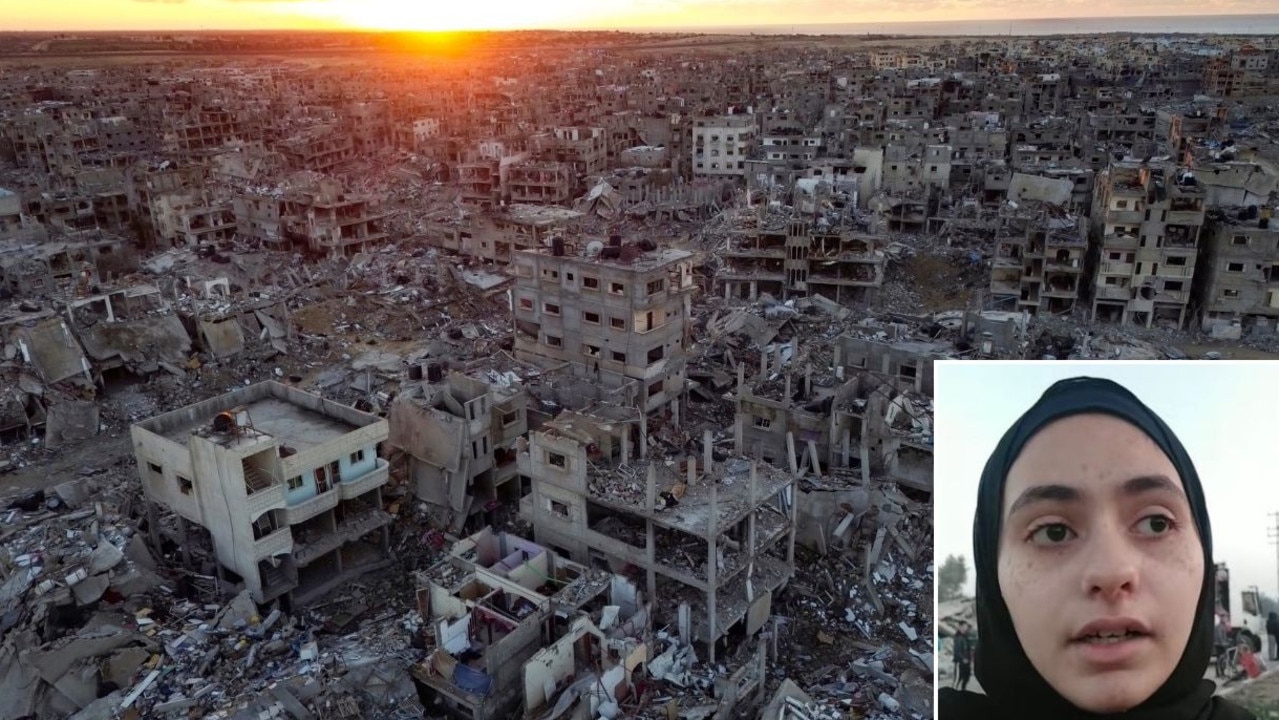Refugees fleeing ground war in Lebanon fear Israel and Hezbollah
In southern Lebanon, the terrorist group portray themselves as the sole guardians against an invasion. However, with Hezbollah members concealed among civilians as thousands flee, some question whether their presence has turned them into a target.
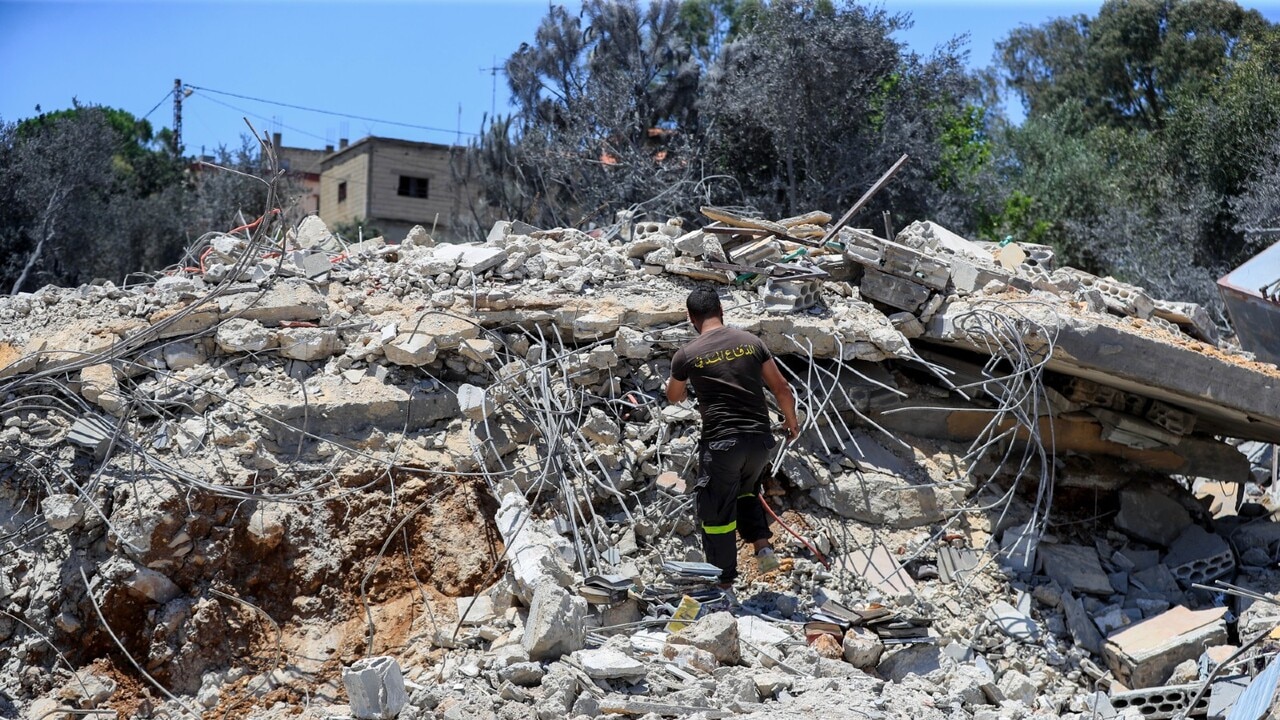
The gravediggers stopped their work when the family arrived, bearing a photograph of their dead: a woman in her thirties with thick brown curls, a girl of about ten on her lap. They had been killed four days earlier in an Israeli strike on an apartment block in Ain el-Delb, a village near the coastal city of Sidon.
Thirteen new graves were being dug in the cemetery, their outlines, marked with names, sketched out on a wall for the gravediggers to follow. One was for the woman and her child. Two others were for Hezbollah fighters, their photographs and names emblazoned on 60cm signs celebrating their martyrdom, killed fighting the Israelis.
The woman and her child had nothing like that, only their picture, printed out on A4 paper, crumpling in the hands of an older woman in a white headscarf. She sat down heavily at the edge of the cemetery and screamed at the loss of her daughter and granddaughter: “My daughter, my daughter. My child.”
A Hezbollah functionary who had been showing us around the area went over to her and started to offer his condolences. “You get out of here,” she snapped. “This is all your fault, all you people’s fault. Get out, I don’t want you here. I don’t want to talk to you.”
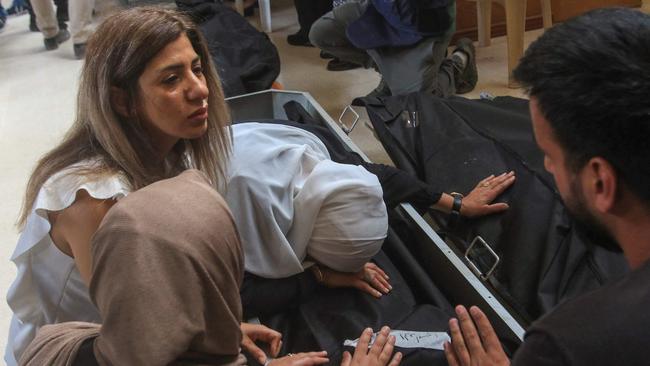
He looked rattled. Here, in the olive groves and valleys of southern Lebanon, Hezbollah likes to see itself as a popular shia Islamist resistance force, its fighters venerated by the public as the only ones who can protect them from their enemies. Flags bearing the faces of Hezbollah martyrs line the streets and the poor queue up at the group’s offices for food or money for rent. At school, children learn about Hezbollah’s heroic exploits in repelling the Israelis last time they invaded, in 2006, and the time before, when they occupied southern Lebanon from 1982 to 2000.
The US and UK, meanwhile, consider Hezbollah a terrorist organisation. Israel is now launching another offensive into southern Lebanon, aimed, it says, at wiping out Hezbollah. Anger in Lebanon is growing both towards the invaders and those sworn to fight them.
The strike in Ain el-Delb, which killed the family of the woman at the graveyard and at least 43 others, brought down a six-storey apartment block, leaving only rubble and steel bars. When we visited the site, excavators were levelling the remains of the building, unearthing splintered furniture and clothes, including a small pink hoodie.
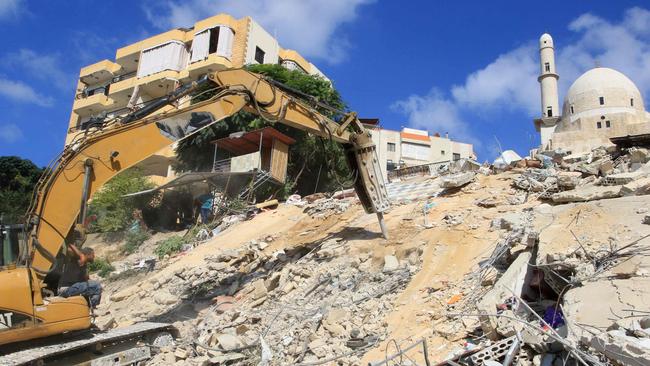
“I saw children with only half their heads left,” said a young man at a shop, who did not want to give his name. The Hezbollah guide assigned to us as a condition of entering the area stood near by, listening to his every word. “I carried 10 bodies from the rubble.”
The Israel Defence Forces say it was targeting a Hezbollah leader who was staying in the building.
Hisham Albaba, 50, who was visiting family in Lebanon on holiday from Berlin, where he works in a pizzeria, was one of the few survivors. He said refugees from the south had been staying in the apartment building and guessed one of them could have been a Hezbollah member.
“Maybe (the IDF) knew someone was there,” he told us from his hospital bed in nearby Sidon, his right eye taped shut, face criss-crossed with cuts. “I don’t know.”
He had lain under the rubble for nine hours before being found by rescuers. His sister, Denise, her husband and their daughter, Narmeen, were all killed along with his nephew Ali, 14.
“Nobody wants war,” Mr Albaba said, repeatedly condemning the Israelis for their invasion. “Of course people are afraid.”
Others are more direct. “I want to ask Hezbollah: why are they doing this?” said one shia mother of three from the south, who did not want to be named because she feared being targeted for criticising the group. “We don’t need this war. It isn’t helping the people in Gaza. It isn’t helping us.”
Hassan Ezzeddine, a Hezbollah member of parliament, claimed in a phone interview that the Lebanese public were united behind the group, which is both a political and militant force, and that the Israeli strikes – which have killed more than 1000 people in the past two weeks – had only made Hezbollah more popular.
Mark Daou, a secular politician from the Druze minority who argues that Hezbollah should be disarmed, said he believed the group still retained a level of popular support. Though belief in Hezbollah’s fighting abilities had been damaged by the strike late last month that killed its leader, Hassan Nasrallah, and much of its top command, it remained the only force in the country poised to stop an invasion from Israel.
“I also think a lot of Lebanese are terrified of what the Israelis might do, after seeing what happened in Gaza,” he said.
“So whoever can push the Israelis back, they would definitely be willing to (support) them.”
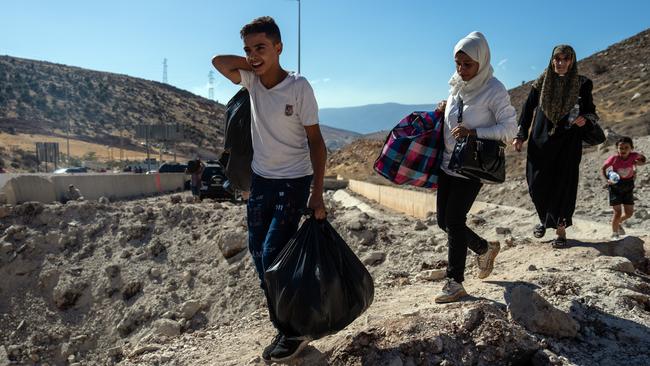
As Israeli soldiers cross the border into southern Lebanon, more than a million people – a fifth of the country’s population – have fled their homes for the north. More than 50,000 have crossed the border into neighbouring Syria.
Strikes by Israel seem set to continue despite pledges last week that it was engaged in a “limited, localised” ground invasion of Lebanon – a retaliation for 12 months of Hezbollah rocket fire into Israel, which it says has resulted in more than 60,000 Israelis being displaced from their homes in the north. Since Israel’s offensive began, parts of southern Lebanon, which is home mostly to shia Muslims but also to sunnis, Christians and Druze, have been all but emptied out, reduced to ghost towns.
Last week, Israel issued an evacuation order telling civilians to leave areas south of the Litani River, which flows from the Bekaa Valley into the Mediterranean, and several cities in the south.
They fled north in their thousands, mattresses tied on to the backs of pick-up trucks. In Sidon, an ancient Phoenician capital just over 50km north of the border, women in black headscarves, their faces grey with exhaustion, sat outside a school repurposed as a shelter. Many locals have taken displaced families into their home. But some greet the arrivals with suspicion, concerned Hezbollah members could be among them.
“People are worried about the existence of Hezbollah members between civilians,” said Souheil Zantout, who works with a leftist political party in Sidon that does not support Hezbollah. “This is because the existence of one Hezbollah member is a threat to the whole building. So that’s what’s making people nervous.”
The wave of displacement could open up old sectarian wounds papered shut in 1990 after the end of the 25-year civil war, which left the country ruled by an unstable, cobbled-together coalition that includes sunni, shia, Christians and Druze.
In Beirut, schools and hotels are packed with refugees from the south, while the poorest and most desperate sleep on the corniche, the promenade by the Mediterranean. Israeli drones buzz overhead, particularly in the southern suburb of Dahiyeh, where Nasrallah was killed.
Each night brings more Israeli strikes, each morning a trek to the smoking remains.
THE SUNDAY TIMES

